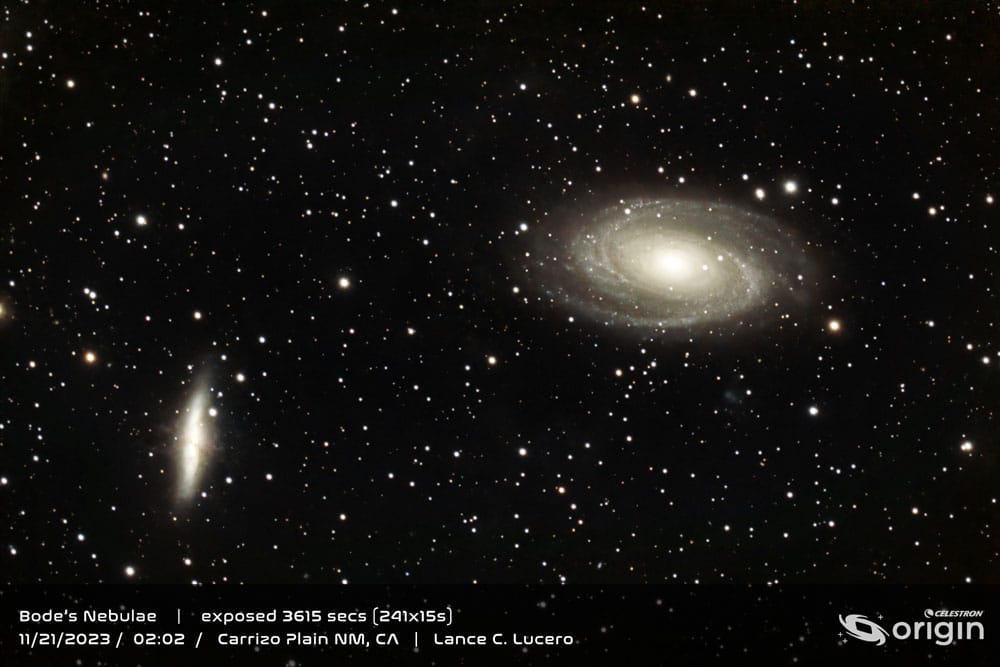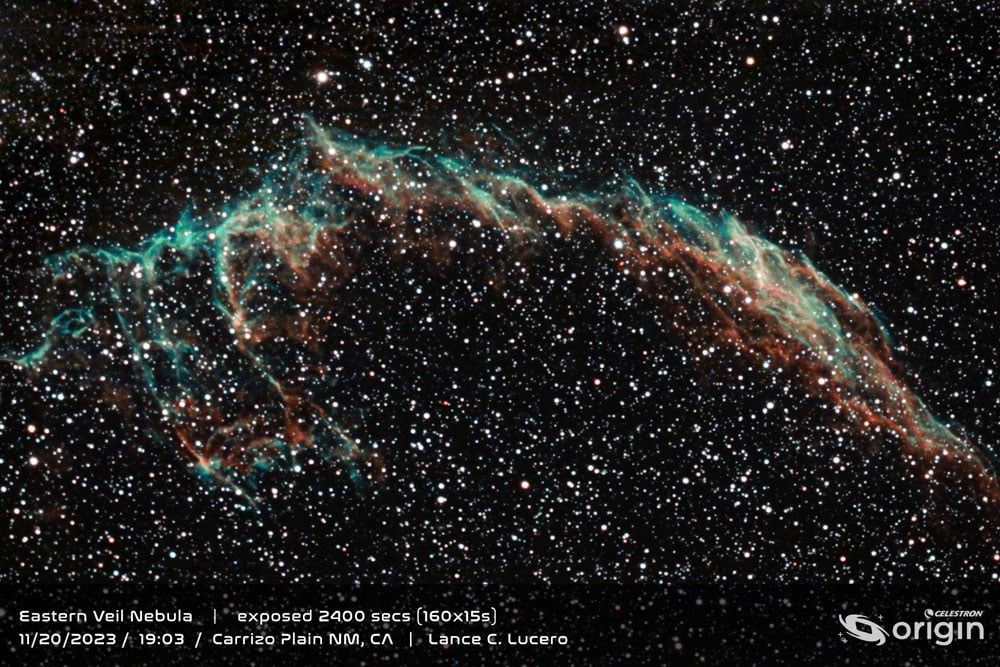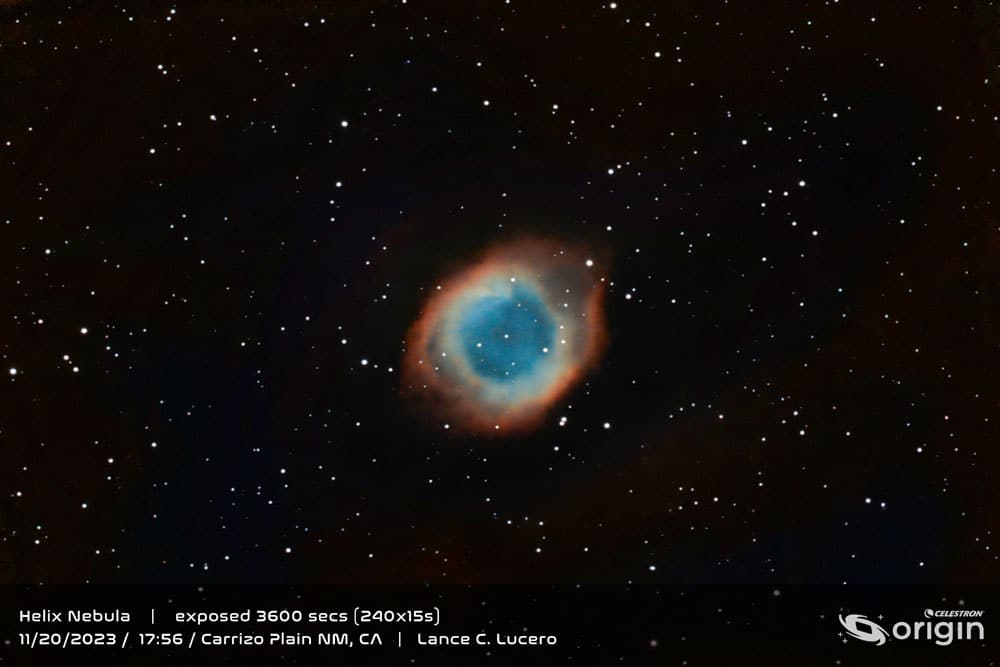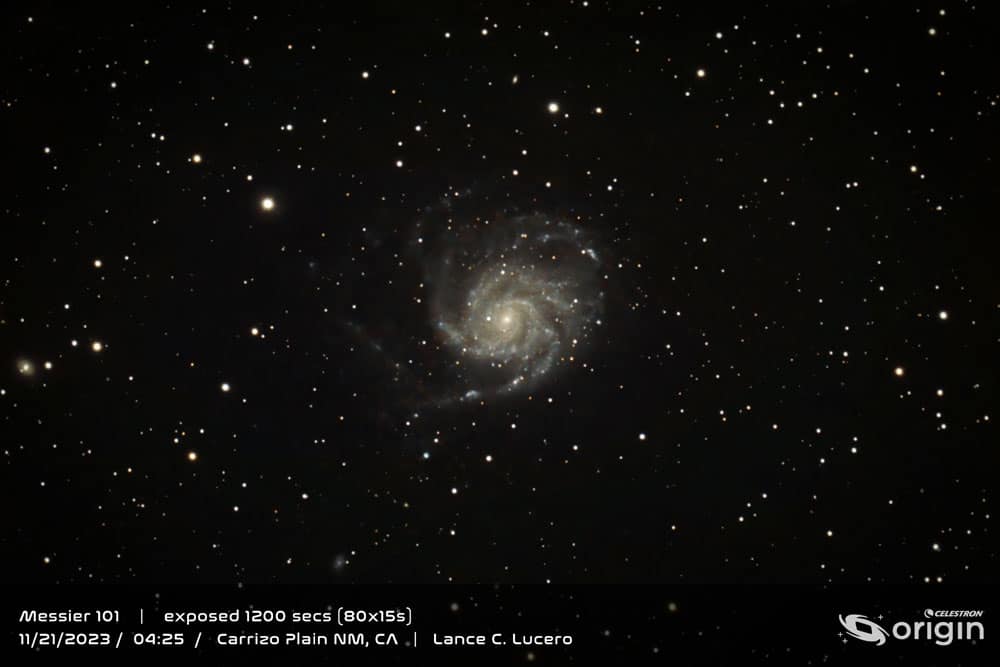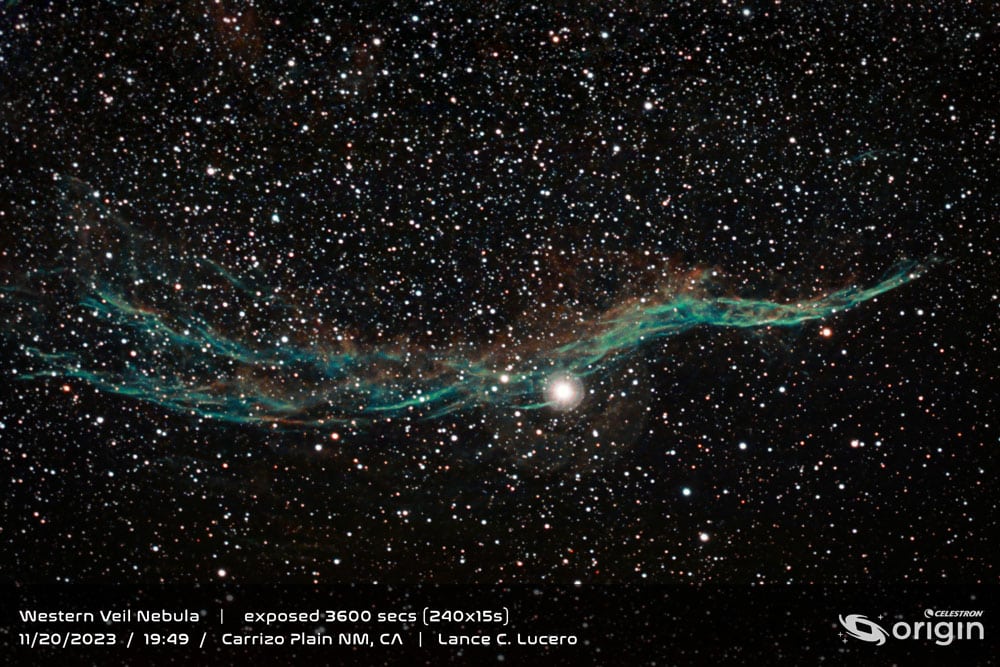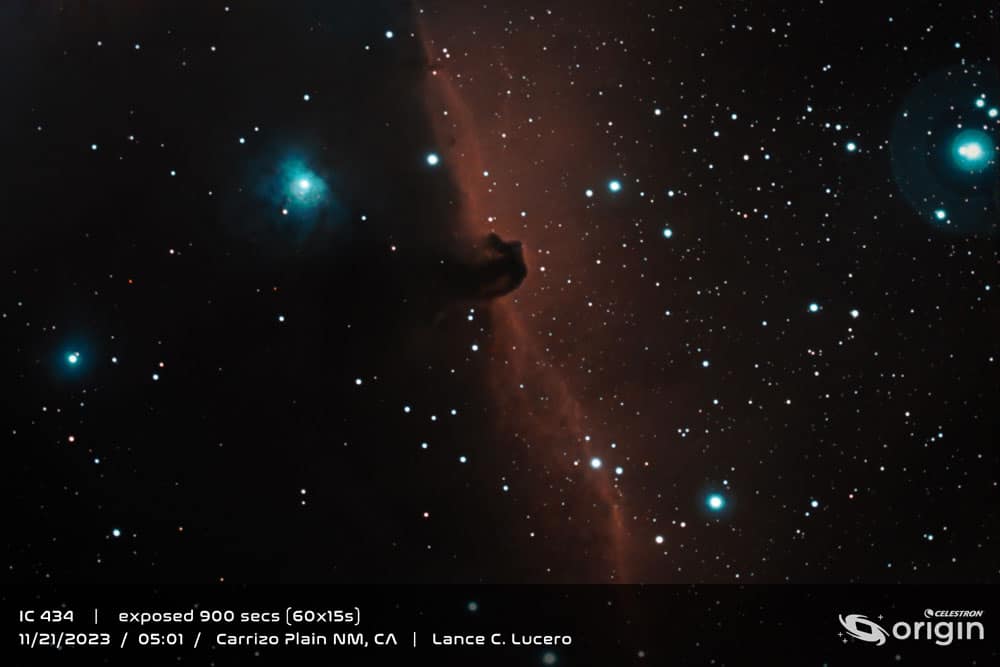Celestron Origin is an intelligent, all-in-one home observatory that records breathtaking images of faint, deep-sky celestial objects and sends them to your phone or tablet. It's stargazing and astroimaging redefined. The photos you quickly take appear better than what you would see under much darker skies via the eyepiece of a much larger telescope.
Innovative RASA Optical Technology: The patented 6" Origin stands apart thanks to its Rowe-Ackermann Schmidt Astrograph (RASA) optical design. With minimal exposure time, you may get unmatched image brightness and clarity because to its big aperture and quick f/2.2 focal ratio.
Automated, AI-driven Astrophotography: In real time, Origin's integrated AI algorithms stack and process each frame on their own as it records data. Without the need for user input, galaxies and nebulae instantaneously come to life, displaying fine details and vibrant colours.
Automated Configuration with StarSense: Launch Origin outside, switch it on, and establish a connection with the application. The unique StarSense technology from Celestron allows Origin to independently scan the sky, focus, and align. Choose a target and begin imaging in less than two minutes.
Simple and Effective Planetarium Interface: Developed in collaboration with Simulation Curriculum, the creators of SkySafari, the intuitive Celestron Origin app for iOS and Android makes it simple to browse the sky and operate the system.
Show Everyone the View: The live stream from the telescope can be viewed concurrently by several users using the Origin app. Additionally, you can immediately store and share the view or cast it to your smart TV.
Advanced Features: Download the unprocessed image files you take for more sophisticated manual processing as your interest in the astronomy grows. Additionally, you can use Origin for land-based daytime observing or night vision by experimenting with the filters.
What's included in the box:
6” RASA optical tube with integrated camera
Origin single fork-arm mount with internal lithium battery
Built-in computer with cooling fans and WiFi
Autofocuser
Dew prevention system with environmental sensor, dew heater ring, and dew shield
Integrated filter drawer
Full-height tripod
Lens cap
AC charger
With its unique and user-friendly combination of astrophotography and stargazing, Celestron Origin is leading the way in a new era of amateur astronomy. With the help of this clever, all-in-one home observatory, you can open a portal to the universe in your backyard by eliminating the complexity of conventional telescopes. Celestron Origin, which is jam-packed with cutting-edge technology, brings the splendour of celestial objects to life on your phone or tablet.
When creating every element of Origin, including its user-friendly companion app and proprietary optical technology, Celestron engineers drew on their decades of experience. The end result is a ground-breaking new technology that expands on the success of Celestron and increases astronomy's accessibility, excitement, and enjoyment.
RASA Optical Technology: Bringing Light to Life
The patented Rowe-Ackermann Schmidt Astrograph (RASA), a significant optical innovation, is the foundation of Celestron Origin. The RASA design places the imaging sensor in front of the telescope tube rather than at its rear, resulting in an incredibly fast f/2.2 system that captures clear images all the way to the edge. RASA technology has emerged as the industry standard for satellite monitoring and space surveillance since its 2014 introduction. Governments, professional research astronomers, and national defence contractors rely on RASA to find small debris particles and space junk, ensuring the safety of our crucial communications satellites in orbit. The optical engineers at Celestron created a brand-new 6" RASA specifically for Origin that has all the features of an observatory-grade instrument in a portable, grab-and-go form.
Origin performs far better than other telescope designs because of RASA. Simply put, RASA produces more photons faster than a refractor, smaller and slower Newtonian reflector, or any other type of entry-level telescope tube. RASA’s unique combination of speed, aperture, and performance delivers outstanding image detail, especially during short exposure times.
To take full use of the RASA optics, Celestron picked the Sony IMX178 colour CMOS sensor to collect your data. In order to produce crisp images as soon as possible, it has STARVIS back-illuminated technology, which offers the maximum sensitivity and fastest readout with minimal noise. With its small 2.4µm2 pixels for excellent resolution, this sensitive device is an ideal fit for the quick optical design.
Transforming Any Backyard Observer into an Astroimager: With its integrated AI algorithms, Celestron Origin presents a revolutionary approach to astrophotography. These clever algorithms automatically stack and process each frame in real time as the telescope gathers data. The outcome is an amazing show of colourful, intricate cosmic objects. Astroimaging is now available to fans of all experience levels, even those who have never used a telescope.
The Origin App & StarSense Technology: A Universe at Your Fingertips
Celestron Origin's automated initialization procedure, which is fueled by StarSense technology, makes setup a breeze. Turn on Origin outside and establish a connection with the application. After that, you can decide to go inside or stay outside with your telescope. After focusing and scanning the night sky for less than two minutes, Origin automatically aligns itself by comparing the patterns of stars overhead to its internal database, and alerts you when it's ready to start your astronomical journey.
The Celestron Origin app, created in partnership with Simulation Curriculum, the company behind SkySafari, provides a user-friendly planetarium interface that makes navigating the night sky easier. Hold your device up to the sky in "compass mode" to see the planetarium view. Tap on any item you like to observe (the best ones are highlighted). Alternatively, you can check out Origin's Tonight's Best list, which shows you all of the most striking star clusters, galaxies, and nebulae according on your exact location and time of observation. You don't need to plan ahead or study a star chart because Origin is always prepared to show you the universe.
After selecting a target, Origin places it exactly in the centre of your field of vision. Press Start Imaging to start taking 10-second exposures while in camera view. It really is that simple! As the goal becomes more and more detailed, you can witness the consequences as they happen in real time. To maintain the sharpness of your photos, Origin continuously scans the sky and modifies its integrated dew prevention technology.
A Common Cosmic Encounter
The days of having to wait in queue to see through an eyepiece are long gone. Origin creates a feeling of togetherness by allowing you to enjoy the breathtaking experience of stargazing together. Multiple users can connect to Origin and stream the view with their own devices, regardless of whether your friends and family are gathered outside or in the same room. To capture special moments outside of your backyard, Origin also enables you to instantly store and share your AstroImages and send the live video to your smart TV.
Advanced Functionalities
With more sophisticated features and functionality, it will help you as you develop your interest with Origin. For instance, the filter drawer integrated into Origin can accommodate filters with conventional 1.25" and 2" formats. Installing optional filters is made possible by this, and it can be quite helpful for imaging nebulae in locations with high light pollution, such as a typical suburban garden. To obtain brighter and more light-throughput photos while capturing broadband objects like as star clusters and galaxies, or objects from dark sky, it is recommended to remove the filter. Try experimenting with replaceable and detachable filters to get results that other systems' fixed filters can't match.
Origin has you covered once more if you want to experiment with sophisticated picture manipulation. Origin saves all of your raw photos for you, in contrast to other systems. Use a USB connection to transfer them into your preferred image-editing programme for manual stacking and editing.
Consider using Origin to do some work for you while you're asleep. With the scheduled observations functionality, that is not an issue. Simply tell the app what items you wish to take pictures of. You will awaken to a plethora of breathtaking pictures.
Acquire a Fresh View In this world
Apart from unveiling far-off planets, Origin can also record amazing pictures of terrestrial objects on Earth, regardless of the time of day. You may manually slew Origin to take pictures of sceneries and landscapes during the day. With Origin's quick optics and sensitive camera, you can see objects in extremely low light levels at night, giving you a performance that is nearly identical to night vision. Take a nighttime look around your campsite or yard to see what you might be missing!
Observe Anywhere with Your Astroimaging Studio
Since Origin is a portable device that doesn't need external WiFi networks, you can drive any car to far-off places with pitch-black skies. Without using any tools, the tripod, mount, and optical tube are all simple to put together and take apart. Every part weights less than sixteen pounds. Optional carry cases are available.
Future updates
You can rely on Celestron's engineers to be your long-term astronomical collaborators when you invest in Origin. Their technical teams are working very hard to provide your Origin with even more updates and improvements. As technology advances, they offer access to Origin's camera, for instance, in case updates are needed in the future. Additionally, they are creating entirely new features for the Origin app and your Origin device.
A few features that will be released in the upcoming months are shown below in advance:
Compatibility with the StarSense Autoguider
Compatibility with the HD Pro Wedge
Support for polar alignment
When combined, these functionalities enable you to utilise Origin for extended exposure astronomical imagery. You will be able to obtain exposure periods of up to 10 minutes or more with accurate polar alignment. However, that is only the start. When new features are added to Origin, Celestron will notify you so you can continue exploring with Celestron!
Technical Specifications:
Optics Info:
Optical Design: Rowe-Ackermann Schmidt Astrograph
Aperture: 152mm (5.98")
Focal Length: 335mm (13.18")
Focal Ratio: f/2.2
Optical Coatings: StarBright XLT coatings throughout
Central Obstruction Diameter: 63mm (2.48") (41% of aperture diameter)
Light Gathering Power (Compared to human eye): 474x
Image Resolution: 1.48 arcsec/pixel
Dovetail: CG-5 Dovetail Bar
Filter Drawer: Integrated, accepts 1.25" or 2" astroimaging filters
Imaging Sensor Info:
CMOS Image Sensor: Sony IMX178LQJ, color, back-illuminated
Sensor Size: 8.92mm (0.35") diagonal
Pixel Size: 2.4μm x 2.4μm
Number of Effective Pixels: 6.44M (3096 x 2080)
Field of View: 1.27° x 0.85°
Integrated Electronics Info:
Onboard Computer: Raspberry Pi 4 Model B
Mount: Computerized GoTo altazimuth mount
Dew Prevention: Fully automated heating element integrated into front lens, removable dew shield/lens shade
Focus Motor: Autofocus or manual control
Cooling Fans: One (1) fan for optics, one (1) fan for electronics, both pull air through vents with wire mesh
LED Status Ring: Indicates status "at-a-glance"
Ports Info:
USB-A: Two (2) on optical tube for accessing raw image files for external processing, one (1) on mount for mobile device charging only
Ethernet: One (1) on optical tube
Auxiliary Ports: Two (2) on optical tube, four (4) on mount
Power Info:
Battery: Integrated LiFePO4, 97.9 Wh, capable of 6+ hours of use
Power Input: 12V DC adapter for charging internal battery or running on external AC power
User Interface Info:
Celestron Origin App: Runs on compatible iOS or Android smartphones and tablets
System Requirements: iOS 16 or higher, Android 12 or higher
Dimensions:
Optical Tube: 609.6mm x 177.8mm (24" x 7") diameter
Mount: 457.2mm x 304.8mm x 254mm (12" x 12" x 10")
Tripod (Collapsed): 330.2mm x 304.8 x 812.8mm (13" x 12" x 32")
Assembled System: 609.6mm L x 660.4mm W x 1219.2mm H (24" L x 26" W x 48" H)
Weight:
Optical Tube: 10.6 lb (4.8 kg)
Mount: 17 lb (7.7 kg)
Tripod: 14 lb (6.35 kg)
Total System: 41.6 lb (18.87 kg)
Solar Warning
Never look directly at the Sun with the naked eye or with an optic (unless you have the proper solar filter). Permanent and irreversible eye damage may result.
Never use your optic to project an image of the Sun onto any surface. Internal heat build-up can damage the optic and any accessories attached to it.
Never leave your optic unsupervised. Make sure an adult who is familiar with the correct operating procedures is with your optic at all times, especially when children are present.
Images Captured with Celestron Origin:
